Farouk Gulsara's Blog, page 156
October 31, 2016
Still twisted!
 http://wallpapersafari.com/Maybe it is just me with my twisted mind. Perhaps the others do not have such morbid imaginations about life. They like to see their glasses half full rather than their nihilistic nemesis. But I cannot help it. My mind seems to go on autopilot, and I cannot press the reboot button. It is hanging but still buzzing under the surface. Luckily it only happens sometimes.
http://wallpapersafari.com/Maybe it is just me with my twisted mind. Perhaps the others do not have such morbid imaginations about life. They like to see their glasses half full rather than their nihilistic nemesis. But I cannot help it. My mind seems to go on autopilot, and I cannot press the reboot button. It is hanging but still buzzing under the surface. Luckily it only happens sometimes.This train of thought came sprawling to me one day when I was given the honour to bear witness to the public declaration of a private intent, i.e. to bless a couple who wish to share their joy of nuptial bliss.
There I was sitting at the back row of the dinner table just watching the world go by. Sometimes, people watching can be therapeutic. It can stimulate your philosophical cords. You can also indulge in a game of one of trying to guess their background, stature, the worries, their fears etceteras. Nobody wins and nobody loses in this meaningless game to kill time.
It dawned upon me the extravagance of wedding ceremonies these days. In the yesteryears, people looked forward to these functions to get together. Fun things to do those days were too few in merriment, hence the anticipation and expectation of merriment by others. With the dearth of social interaction, these events were opportunities for economic ventures, arena to flaunt one's achievement and a place for prospective life partners to meet.
In this fast moving world where people are trying to be, and miserably failing, to juggle many balls, multitask and wear many hats, it does not make any sense, really! Unlike those days, where food was scarce to come by, we live in in a food fetish and mega-helpings era. This kind gluttony is the last thing the modern man needs to keep his waistline in check. How the heck is he going to stay true to weight watching regimes?
With the uncertain economic climate looming over us, perhaps it is wise to be prudent. With the government coffers getting dry, it may just alert the antennas of the taxman to plan his next kill for his supper. If statistics were anything to buy, the newly weds have a 50-50 chance of hating each others' guts in years to time. There may be a real chance of them needing to do all again after there get bored with each other! Death does not have to do them apart. With so much distraction and lure to indulge in casual liaisons, it had never been easier and more tempting.
Now you know why I say my mind is twisted!http://asok22.wix.com/rifle-range-boy
http://.facebook.com/farouk.gulsara

Published on October 31, 2016 16:07
October 29, 2016
The blurred boundaries of friend and lover zones
Ae Dil Ki Mushkil (Hindi, 2016)
 Gone are the days when the sanctity of conjugal union and the adage of one man to one woman is guarded until the end of time till death do them apart. Poetic justice would be the order of the day as if one person was born for the other. Love triangles would invariably end up with either one sacrificing his/her love or his demise. The sanctity of marriage or love was kept 'pure'. Coming together of man and woman (only man and woman) is for ever, and there is no such thing as changing partners. People does not break relationships because it does not fulfil their inner desires or because it is meaningless. They make do with what they have and find happiness even the most hopeless of circumstances. When offspring come into the picture, the purpose seems more clear cut.
Gone are the days when the sanctity of conjugal union and the adage of one man to one woman is guarded until the end of time till death do them apart. Poetic justice would be the order of the day as if one person was born for the other. Love triangles would invariably end up with either one sacrificing his/her love or his demise. The sanctity of marriage or love was kept 'pure'. Coming together of man and woman (only man and woman) is for ever, and there is no such thing as changing partners. People does not break relationships because it does not fulfil their inner desires or because it is meaningless. They make do with what they have and find happiness even the most hopeless of circumstances. When offspring come into the picture, the purpose seems more clear cut.
That is in the perfect world of Tinseltown. The celluloid industry used to set the standards of how live should be lived and stuck set in its agenda of praising the age old Indian idea of monoamory and loyalty. The World has changed and ancient ideas have become passe. Hence, Bollywood too has to metamorphose.
The gender role too has changed over the years. From a docile, submissive and non-confrontational stance who would exert their influences from the sidelines in the yesteryears, women have evolved to statures of wielding power, self-reliance and self-sustenance. In the matters of the heart too, they now hold the rein of what they feel and what they desire. They are no more the ones who needs mollycoddling but instead take the upper hand of things. Wearing the pants is no more the masculine domain. Conversely, generations of shielding by their mothers of their prized jewel crowns by their mothers have turned into fragile wimps who need emotional lullaby and potty training.
This film courted meaningless controversy when the casting directors decided to employ an actor from their neighbouring country's not-so-glamorous movie industry. It snowballed to become yet another divide in the country into a dichotomy who claim nationalistic spirits through division and the other via inclusion. In the end, the tiff just helps to give free publicity. The movie makers smile all the way to the bank whilst it means little to the little men on the streets.
The movie tells the tale of a wealthy kid's supposedly doing MBA in London and goes around in search of love in the wrong people. The person with whom he falls flat for, only look at him from a platonic angle. The melodrama which follows deals tries to convince its audiences that people of different sexes can do everything under the stars including sharing the same bed at night and call the relationship 'just friends yaar!'http://asok22.wix.com/rifle-range-boy
http://.facebook.com/farouk.gulsara
 Gone are the days when the sanctity of conjugal union and the adage of one man to one woman is guarded until the end of time till death do them apart. Poetic justice would be the order of the day as if one person was born for the other. Love triangles would invariably end up with either one sacrificing his/her love or his demise. The sanctity of marriage or love was kept 'pure'. Coming together of man and woman (only man and woman) is for ever, and there is no such thing as changing partners. People does not break relationships because it does not fulfil their inner desires or because it is meaningless. They make do with what they have and find happiness even the most hopeless of circumstances. When offspring come into the picture, the purpose seems more clear cut.
Gone are the days when the sanctity of conjugal union and the adage of one man to one woman is guarded until the end of time till death do them apart. Poetic justice would be the order of the day as if one person was born for the other. Love triangles would invariably end up with either one sacrificing his/her love or his demise. The sanctity of marriage or love was kept 'pure'. Coming together of man and woman (only man and woman) is for ever, and there is no such thing as changing partners. People does not break relationships because it does not fulfil their inner desires or because it is meaningless. They make do with what they have and find happiness even the most hopeless of circumstances. When offspring come into the picture, the purpose seems more clear cut.That is in the perfect world of Tinseltown. The celluloid industry used to set the standards of how live should be lived and stuck set in its agenda of praising the age old Indian idea of monoamory and loyalty. The World has changed and ancient ideas have become passe. Hence, Bollywood too has to metamorphose.
The gender role too has changed over the years. From a docile, submissive and non-confrontational stance who would exert their influences from the sidelines in the yesteryears, women have evolved to statures of wielding power, self-reliance and self-sustenance. In the matters of the heart too, they now hold the rein of what they feel and what they desire. They are no more the ones who needs mollycoddling but instead take the upper hand of things. Wearing the pants is no more the masculine domain. Conversely, generations of shielding by their mothers of their prized jewel crowns by their mothers have turned into fragile wimps who need emotional lullaby and potty training.
This film courted meaningless controversy when the casting directors decided to employ an actor from their neighbouring country's not-so-glamorous movie industry. It snowballed to become yet another divide in the country into a dichotomy who claim nationalistic spirits through division and the other via inclusion. In the end, the tiff just helps to give free publicity. The movie makers smile all the way to the bank whilst it means little to the little men on the streets.
The movie tells the tale of a wealthy kid's supposedly doing MBA in London and goes around in search of love in the wrong people. The person with whom he falls flat for, only look at him from a platonic angle. The melodrama which follows deals tries to convince its audiences that people of different sexes can do everything under the stars including sharing the same bed at night and call the relationship 'just friends yaar!'http://asok22.wix.com/rifle-range-boy
http://.facebook.com/farouk.gulsara

Published on October 29, 2016 01:46
October 28, 2016
Finale...
Published on October 28, 2016 15:37
October 27, 2016
They just don't understand!
Khane-ye doust kodjast (Persian, خانه دوست کجاست, Where Is the Friend's Home?; 1987) \
Directed and written by Abbas Kiarostami
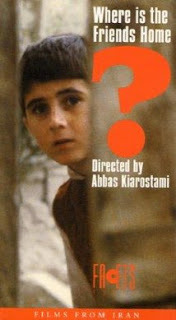 This film is the first of Kiarostami's Koker trilogy. Just like its successors, it brings to the fore the day to day living, beliefs and trappings of a typical Iranian in its poor countrysides. This time, it looks at it from the eyes of a young school boy, Ahmadpoor.
This film is the first of Kiarostami's Koker trilogy. Just like its successors, it brings to the fore the day to day living, beliefs and trappings of a typical Iranian in its poor countrysides. This time, it looks at it from the eyes of a young school boy, Ahmadpoor.
He has a big burden on his shoulders. He had brought home his friend Reza's writing book by mistake. And he is worried for his friend. His teacher had specifically told Reza that he would be expelled from school if he persistently neglects to finish his school homework. So, as a loyal friend, Ahmad feels duty-bound to pass the book to him.
The trouble is that Ahmad's overworked mother keeps asking him to mind his baby kid and do chores around the house. His pleas to his busy mother are drowned in the wailing of the crying child. So, when his mother asks him to buy bread, he makes a dash to his friend's house. Herein lies another problem. Reza lives in another area. Nobody seems to know the whereabout, like as if the adults would know about the whereabout of the kids! It is worse when he does not know his surname and his address.
After much running around meeting different characters, Ahmad returns home disappointed. So as a good friend, he does his friend's homework and passes it to him at school. And saves the day!
It is the same story over the years; the adults think that the kids are having such a cushy time and that they (the adults) had it bad, and the kids think that adults just do not understand their urgency! The adults would say, "small things excite small mind". On the children's end, those little things are the very ones that shape their world. This, my friend, is called generational gap.

http://asok22.wix.com/rifle-range-boy
http://.facebook.com/farouk.gulsara
Directed and written by Abbas Kiarostami
 This film is the first of Kiarostami's Koker trilogy. Just like its successors, it brings to the fore the day to day living, beliefs and trappings of a typical Iranian in its poor countrysides. This time, it looks at it from the eyes of a young school boy, Ahmadpoor.
This film is the first of Kiarostami's Koker trilogy. Just like its successors, it brings to the fore the day to day living, beliefs and trappings of a typical Iranian in its poor countrysides. This time, it looks at it from the eyes of a young school boy, Ahmadpoor.He has a big burden on his shoulders. He had brought home his friend Reza's writing book by mistake. And he is worried for his friend. His teacher had specifically told Reza that he would be expelled from school if he persistently neglects to finish his school homework. So, as a loyal friend, Ahmad feels duty-bound to pass the book to him.
The trouble is that Ahmad's overworked mother keeps asking him to mind his baby kid and do chores around the house. His pleas to his busy mother are drowned in the wailing of the crying child. So, when his mother asks him to buy bread, he makes a dash to his friend's house. Herein lies another problem. Reza lives in another area. Nobody seems to know the whereabout, like as if the adults would know about the whereabout of the kids! It is worse when he does not know his surname and his address.
After much running around meeting different characters, Ahmad returns home disappointed. So as a good friend, he does his friend's homework and passes it to him at school. And saves the day!
It is the same story over the years; the adults think that the kids are having such a cushy time and that they (the adults) had it bad, and the kids think that adults just do not understand their urgency! The adults would say, "small things excite small mind". On the children's end, those little things are the very ones that shape their world. This, my friend, is called generational gap.

http://asok22.wix.com/rifle-range-boy
http://.facebook.com/farouk.gulsara

Published on October 27, 2016 09:19
October 25, 2016
Not just another tale to tell
There must be something wrong with our top down approach in teaching History to our young ones. And what do you expect from the politicians who always keep changing the origin and the course of history as they fancy to befit their bedevilled agenda?
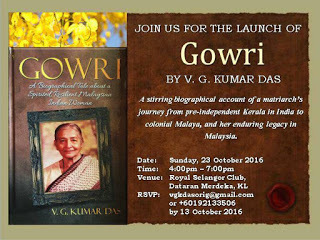 The real history of a civilisation and a nation should be rightly learnt from a ground-up manner. The real story lies hidden amongst the many untold narrations of the little people, the fabric who make the nation, not the generals and warlords who look at events of the day through their rose tinted glasses who would want themselves to be portrayed in Annals of times as heroes.
The real history of a civilisation and a nation should be rightly learnt from a ground-up manner. The real story lies hidden amongst the many untold narrations of the little people, the fabric who make the nation, not the generals and warlords who look at events of the day through their rose tinted glasses who would want themselves to be portrayed in Annals of times as heroes.
Many such stories of the ordinary people remain untold in this country. Their viewpoints had never been seen as sexy or newsworthy. After all, they are just economic migrants in pursuit of survival from a land already in ruins. What do they know? They are sometimes viewed by the earlier dwellers as just snatchers of the country's wealth to send it back to their land of origin. They never had it good in any way. If the push factor from their Motherland was not bad enough, the situation in Malaya was no bed of roses either. If there they suffered from deprivations and diseases arising thereof, here they had to battle with the excesses, the torrential monsoon rain, the scorching heat and its illnesses as well - malaria and filariasis. And the war that rocked the whole world. If that was not enough, the scourge of the communist and political interplay of the superpowers were to follow.
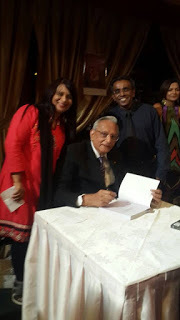 Prof VGK Dass, putting aside his academic hat to indulge in a biography-novel writing, did his part by paying homage to this deceased mother. He relives his mother 's escapades through the turbulent years of old pre-WW2 Malaya all through to her demise. He inked her struggles of bringing up her seven children as a young widow in a foreign country with her strong determination as her weapon, her trust in God as her shield and her never-say-die attitude as her ammunition to bring her family to steady ground. Along the way, she contributed her share to nation building. The biography tells her interactions with her new comrades of various ethnicities and her adjustments to the new country.
Prof VGK Dass, putting aside his academic hat to indulge in a biography-novel writing, did his part by paying homage to this deceased mother. He relives his mother 's escapades through the turbulent years of old pre-WW2 Malaya all through to her demise. He inked her struggles of bringing up her seven children as a young widow in a foreign country with her strong determination as her weapon, her trust in God as her shield and her never-say-die attitude as her ammunition to bring her family to steady ground. Along the way, she contributed her share to nation building. The biography tells her interactions with her new comrades of various ethnicities and her adjustments to the new country.
The book also narrates of this matriarchal's travels, her friends, her relatives and her joy with her kids and grandchildren."Gowri' is a tribute by the eldest son to his mother who was widowed at 42 and he lost his father at 17, who co-parented his six other siblings.
To order http://www.gowribiography.com/
P.S. Another struggle yet to be told (http://asokan63.blogspot.my/2014/01/eulogy.html)http://asok22.wix.com/rifle-range-boy
http://.facebook.com/farouk.gulsara
 The real history of a civilisation and a nation should be rightly learnt from a ground-up manner. The real story lies hidden amongst the many untold narrations of the little people, the fabric who make the nation, not the generals and warlords who look at events of the day through their rose tinted glasses who would want themselves to be portrayed in Annals of times as heroes.
The real history of a civilisation and a nation should be rightly learnt from a ground-up manner. The real story lies hidden amongst the many untold narrations of the little people, the fabric who make the nation, not the generals and warlords who look at events of the day through their rose tinted glasses who would want themselves to be portrayed in Annals of times as heroes.Many such stories of the ordinary people remain untold in this country. Their viewpoints had never been seen as sexy or newsworthy. After all, they are just economic migrants in pursuit of survival from a land already in ruins. What do they know? They are sometimes viewed by the earlier dwellers as just snatchers of the country's wealth to send it back to their land of origin. They never had it good in any way. If the push factor from their Motherland was not bad enough, the situation in Malaya was no bed of roses either. If there they suffered from deprivations and diseases arising thereof, here they had to battle with the excesses, the torrential monsoon rain, the scorching heat and its illnesses as well - malaria and filariasis. And the war that rocked the whole world. If that was not enough, the scourge of the communist and political interplay of the superpowers were to follow.
 Prof VGK Dass, putting aside his academic hat to indulge in a biography-novel writing, did his part by paying homage to this deceased mother. He relives his mother 's escapades through the turbulent years of old pre-WW2 Malaya all through to her demise. He inked her struggles of bringing up her seven children as a young widow in a foreign country with her strong determination as her weapon, her trust in God as her shield and her never-say-die attitude as her ammunition to bring her family to steady ground. Along the way, she contributed her share to nation building. The biography tells her interactions with her new comrades of various ethnicities and her adjustments to the new country.
Prof VGK Dass, putting aside his academic hat to indulge in a biography-novel writing, did his part by paying homage to this deceased mother. He relives his mother 's escapades through the turbulent years of old pre-WW2 Malaya all through to her demise. He inked her struggles of bringing up her seven children as a young widow in a foreign country with her strong determination as her weapon, her trust in God as her shield and her never-say-die attitude as her ammunition to bring her family to steady ground. Along the way, she contributed her share to nation building. The biography tells her interactions with her new comrades of various ethnicities and her adjustments to the new country. The book also narrates of this matriarchal's travels, her friends, her relatives and her joy with her kids and grandchildren."Gowri' is a tribute by the eldest son to his mother who was widowed at 42 and he lost his father at 17, who co-parented his six other siblings.
To order http://www.gowribiography.com/
P.S. Another struggle yet to be told (http://asokan63.blogspot.my/2014/01/eulogy.html)http://asok22.wix.com/rifle-range-boy
http://.facebook.com/farouk.gulsara

Published on October 25, 2016 09:27
October 24, 2016
Advice meant only for others?
By Devdutt Pattanaik
 Konark Sun Temple
Konark Sun Temple
One of the most disturbing stories that we find it the Puranas is the story of Krishna's son Samba, whose mother was the bear-princes, Jambavati.
He dupes his father's junior wives by disguising himself as Krishna and is cursed by Krishna that he will suffer from a skin disease that will enable his wives to distinguish father and son. Samba is cured after he builds temples to the sun. All sun temples in India, from Konark in Odisha to Modhera in Gujarat to Markand in Kashmir, are attributed to this son of Krishna.
Samba also attempts to kidnap Duryodhana's daughter and this leads to war between the Kauravas and the Yadavas. Peace is restored, and the marriage is solemnised, only after Balarama, Krishna's elder brother, and Samba's uncle, in a fit of fury threatens to drag Hastinapur into the sea.
Then there is the story of Samba pretending to be a pregnant woman and duping sages who were visiting Dwaraka. They sages were not amused and cursed Samba that he would give birth to an iron mace that would be responsible for the end of the Yadu clan.
Must not Krishna's son be as noble and divine and wise and loving as Krishna? But that is not so. Samba comes with his own personality and his own destiny over which Krishna has no influence. Or does he?
Can we wonder if Samba was a product of his father's neglect? For was not Krishna spending most of his time with Arjuna and the Pandavas and in the politics of Kuru-kshetra?There are hardly any stories of Krishna as father. He is a friend, philosopher and guide to Arjuna, but the only stories of father and son are of tension, rage and violence. In conversations about corporations, we often forget about the other half of our lives, the personal one. As more and more people are working 24x7, thanks to Internet, and smart devices, the lines between professional and personal, work and life are getting blurred. In fact, people feel noble when they sacrifice family for work and guilty when they take a holiday to take care of their family.
Family is not seen as achievement. Children are not seen as purpose. They are seen as obligations, duties, by-products of existence, even collateral damage.
We admire leaders who sacrifice family for a 'larger' cause. Like freedom fighters who neglect their wives and children. Like business men and entrepreneurs and consultants who spend most of their time in office.
With the rise of feminism, women are also working. Parenting has been outsourced to maids, teachers, computers, video-games and grandparents.
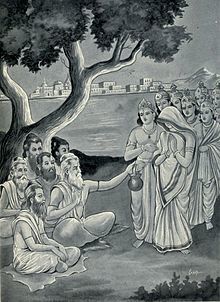 Women who work in the office have not been compensated by their husbands spending more time at home. Instead women are made to feel guilty for not being good mothers. No one questions men for not being good fathers. Eventually, the office wins. Absent parents rationalise how office is more important than the children: we need the money, the children eventually grow up, surely our needs are also important.
Women who work in the office have not been compensated by their husbands spending more time at home. Instead women are made to feel guilty for not being good mothers. No one questions men for not being good fathers. Eventually, the office wins. Absent parents rationalise how office is more important than the children: we need the money, the children eventually grow up, surely our needs are also important.
Many great Krishnas in the workplace discover that they have nurtured Samba at home: sons who either follow destructive paths as they seek attention, or sons who make their way away from parents, as they have grown used to not having them around. Who wins?
Corporations were supposed to create wealth for the family. Now families are creating only workers for the corporation. We have many more Krishnas in this generation and maybe many Sambas in the next.
http://indiaopines.com/samba-lord-krishna-son/

http://asok22.wix.com/rifle-range-boy
http://.facebook.com/farouk.gulsara
 Konark Sun Temple
Konark Sun TempleOne of the most disturbing stories that we find it the Puranas is the story of Krishna's son Samba, whose mother was the bear-princes, Jambavati.
He dupes his father's junior wives by disguising himself as Krishna and is cursed by Krishna that he will suffer from a skin disease that will enable his wives to distinguish father and son. Samba is cured after he builds temples to the sun. All sun temples in India, from Konark in Odisha to Modhera in Gujarat to Markand in Kashmir, are attributed to this son of Krishna.
Samba also attempts to kidnap Duryodhana's daughter and this leads to war between the Kauravas and the Yadavas. Peace is restored, and the marriage is solemnised, only after Balarama, Krishna's elder brother, and Samba's uncle, in a fit of fury threatens to drag Hastinapur into the sea.
Then there is the story of Samba pretending to be a pregnant woman and duping sages who were visiting Dwaraka. They sages were not amused and cursed Samba that he would give birth to an iron mace that would be responsible for the end of the Yadu clan.
Must not Krishna's son be as noble and divine and wise and loving as Krishna? But that is not so. Samba comes with his own personality and his own destiny over which Krishna has no influence. Or does he?
Can we wonder if Samba was a product of his father's neglect? For was not Krishna spending most of his time with Arjuna and the Pandavas and in the politics of Kuru-kshetra?There are hardly any stories of Krishna as father. He is a friend, philosopher and guide to Arjuna, but the only stories of father and son are of tension, rage and violence. In conversations about corporations, we often forget about the other half of our lives, the personal one. As more and more people are working 24x7, thanks to Internet, and smart devices, the lines between professional and personal, work and life are getting blurred. In fact, people feel noble when they sacrifice family for work and guilty when they take a holiday to take care of their family.
Family is not seen as achievement. Children are not seen as purpose. They are seen as obligations, duties, by-products of existence, even collateral damage.
We admire leaders who sacrifice family for a 'larger' cause. Like freedom fighters who neglect their wives and children. Like business men and entrepreneurs and consultants who spend most of their time in office.
With the rise of feminism, women are also working. Parenting has been outsourced to maids, teachers, computers, video-games and grandparents.
 Women who work in the office have not been compensated by their husbands spending more time at home. Instead women are made to feel guilty for not being good mothers. No one questions men for not being good fathers. Eventually, the office wins. Absent parents rationalise how office is more important than the children: we need the money, the children eventually grow up, surely our needs are also important.
Women who work in the office have not been compensated by their husbands spending more time at home. Instead women are made to feel guilty for not being good mothers. No one questions men for not being good fathers. Eventually, the office wins. Absent parents rationalise how office is more important than the children: we need the money, the children eventually grow up, surely our needs are also important. Many great Krishnas in the workplace discover that they have nurtured Samba at home: sons who either follow destructive paths as they seek attention, or sons who make their way away from parents, as they have grown used to not having them around. Who wins?
Corporations were supposed to create wealth for the family. Now families are creating only workers for the corporation. We have many more Krishnas in this generation and maybe many Sambas in the next.
http://indiaopines.com/samba-lord-krishna-son/

http://asok22.wix.com/rifle-range-boy
http://.facebook.com/farouk.gulsara

Published on October 24, 2016 09:33
October 22, 2016
First east of Suez!
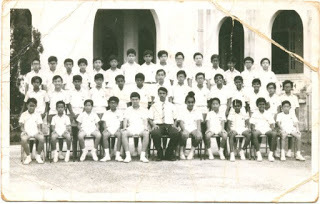 Malaya had it better. Not that we were not colonised but because our colonial masters were much kinder than some that over neighbours got. Look at the Indochinese countries and the mess the French left behind. Their masters not only pilfered the region of its wealth but try to erase their advanced ancient culture. The Dutch left a bad aftertaste even long after their long departure. Belgians used their subjects as target practice to milk their dry of their diamonds, minerals, natural resources and even exotic fauna. Even the Land of the Free, the Thais, did not gain so much of order in their country.
Malaya had it better. Not that we were not colonised but because our colonial masters were much kinder than some that over neighbours got. Look at the Indochinese countries and the mess the French left behind. Their masters not only pilfered the region of its wealth but try to erase their advanced ancient culture. The Dutch left a bad aftertaste even long after their long departure. Belgians used their subjects as target practice to milk their dry of their diamonds, minerals, natural resources and even exotic fauna. Even the Land of the Free, the Thais, did not gain so much of order in their country.Malaya was left by the captors a proper system of administration, legal and education systems when they finally gain independence. With this head start, they started their status as a new country with an advantageous jump-start. The euphoria of the new nation pushed it great heights producing new talents from the clan of natives.
The same thing happened in the field of education. We have Penang Free School, St Xavier's Institution, Andersons, Victoria Institution, St Paul's, St Francis Institute and many more. The products of these schools had served this country well all this while. Unfortunately, many turns of events after people of a particular vision of how our nation should be heading, took the helm, these godowns of knowledge have turned into just another certificate stomping factories churning out half-baked scholars dearth of scholastic and charismatic prowesses! They have become just another statistic in the list of schools providing basic literacy to the nation.
 No doubt the upper crust of echelon are there yearning to serve the motherland, but like a stepchild, they are discriminated. Hence what do they become? They only provide a reservoir for the rest of the world with their level-headed leader to pinch our boys, give citizenship, to tie them down and prosper.
No doubt the upper crust of echelon are there yearning to serve the motherland, but like a stepchild, they are discriminated. Hence what do they become? They only provide a reservoir for the rest of the world with their level-headed leader to pinch our boys, give citizenship, to tie them down and prosper. This is the impression I got when I had the chance to meet many of my long lost school mates over the weekend in my alma mater's celebration of its 200th year of establishment. Many of classmates have been engulfed by the red dot at the southern tip of our country. Others have looked and moved westwards. It appears like this country has to make do with discards and half-boiled visions. Reaching excellence is nowhere on our agenda.

http://asok22.wix.com/rifle-range-boy
http://.facebook.com/farouk.gulsara

Published on October 22, 2016 17:43
October 21, 2016
How one Malaysian school became a bright spot in colonialism’s dark legacy
http://m.scmp.com/comment/insight-opinion/article/2038580/how-one-malaysian-school-became-bright-spot-colonialismsN. Balakrishnan celebrates the founding two centuries ago of Southeast Asia’s oldest English school, which gave generations of youth an education not just of the mind, but also of the heart. N. BALAKRISHNANPUBLISHED : Thursday, 20 October, 2016, 12:39pmUPDATED : Thursday, 20 October, 2016, 12:39pm

The Penang Free School. Minority voices have been saying that the old school was a colonial relic best forgotten.
But while the school may have been “elitist” in one sense, it was also an avenue for social mobility for many.
Neither of my parents knew any English. The reason I can write passable English is down to the schools I attended in Penang, Malaysia. Penang Free School, my secondary school, celebrates its 200th anniversary on October 21. It was established three years before modern Singapore was “founded” by Stamford Raffles, and is the oldest English school in Southeast Asia.
The school’s storied history reminds me of the Janus-faced nature of British colonialism in this part of the world. One article of faith since my youngest days has been that colonialism is an evil system. Today, however, I realise colonialism has its merits; it moulded me and many generations in Malaysia in more ways, both positive and negative, than we would like to admit.
The founder of Penang Free School, English clergyman Robert Sparke Hutchings, who died of malaria in his 40s in Penang, proved that not all who worked for the East India Company were exploiters. He seemed a farsighted man, who wanted to ensure the school was free of religious control.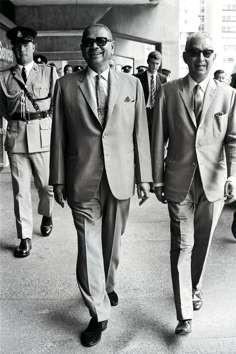 Malaysia’s first prime minister Tunku Abdul Rahman, and the nation’s best known actor P. Ramlee, were educated there, along with many academics and Dr Wu Lien Teh, the physician who was instrumental in fighting the plague in China by recommending the cremation of victims, a revolutionary idea at that time.Minority voices have been saying that the old school was a colonial relic best forgotten. But while the school may have been “elitist” in one sense, it was also an avenue for social mobility for many. It also taught us the quaint notion that duty and team spirit are more important than “winner takes all” individualism. As one classmate and good friend said, the school was built to produce the self-sacrificing civil servants needed to keep the empire going, except that the empire it was meant to serve collapsed but the school kept churning out students with character anyway.The result is that Free School boys, particularly the Chinese and Indian Malaysians among them, can be found scattered around the world, since opportunities became narrow in the modern Malaysia of ethnic preferences.Both Abdul Rahman and P. Ramlee died poor. I cannot think of any Malaysian prime minister or famous actor today who will die in anything but extreme luxury. The values taught by the school may seem absurd in contemporary Malaysia. But looking at the greed and selfishness that is not only prevalent but admired today, I think maybe Reverend Hutchings should be seen as an inspiration. On October 21, for the first time in my life, I will be sincerely toasting the merits of colonialism.N. Balakrishnan is a Hong Kong-based businessman.http://asok22.wix.com/rifle-range-boy
Malaysia’s first prime minister Tunku Abdul Rahman, and the nation’s best known actor P. Ramlee, were educated there, along with many academics and Dr Wu Lien Teh, the physician who was instrumental in fighting the plague in China by recommending the cremation of victims, a revolutionary idea at that time.Minority voices have been saying that the old school was a colonial relic best forgotten. But while the school may have been “elitist” in one sense, it was also an avenue for social mobility for many. It also taught us the quaint notion that duty and team spirit are more important than “winner takes all” individualism. As one classmate and good friend said, the school was built to produce the self-sacrificing civil servants needed to keep the empire going, except that the empire it was meant to serve collapsed but the school kept churning out students with character anyway.The result is that Free School boys, particularly the Chinese and Indian Malaysians among them, can be found scattered around the world, since opportunities became narrow in the modern Malaysia of ethnic preferences.Both Abdul Rahman and P. Ramlee died poor. I cannot think of any Malaysian prime minister or famous actor today who will die in anything but extreme luxury. The values taught by the school may seem absurd in contemporary Malaysia. But looking at the greed and selfishness that is not only prevalent but admired today, I think maybe Reverend Hutchings should be seen as an inspiration. On October 21, for the first time in my life, I will be sincerely toasting the merits of colonialism.N. Balakrishnan is a Hong Kong-based businessman.http://asok22.wix.com/rifle-range-boy
http://.facebook.com/farouk.gulsara

The Penang Free School. Minority voices have been saying that the old school was a colonial relic best forgotten.
But while the school may have been “elitist” in one sense, it was also an avenue for social mobility for many.
Neither of my parents knew any English. The reason I can write passable English is down to the schools I attended in Penang, Malaysia. Penang Free School, my secondary school, celebrates its 200th anniversary on October 21. It was established three years before modern Singapore was “founded” by Stamford Raffles, and is the oldest English school in Southeast Asia.
The school’s storied history reminds me of the Janus-faced nature of British colonialism in this part of the world. One article of faith since my youngest days has been that colonialism is an evil system. Today, however, I realise colonialism has its merits; it moulded me and many generations in Malaysia in more ways, both positive and negative, than we would like to admit.
The founder of Penang Free School, English clergyman Robert Sparke Hutchings, who died of malaria in his 40s in Penang, proved that not all who worked for the East India Company were exploiters. He seemed a farsighted man, who wanted to ensure the school was free of religious control.
 Malaysia’s first prime minister Tunku Abdul Rahman, and the nation’s best known actor P. Ramlee, were educated there, along with many academics and Dr Wu Lien Teh, the physician who was instrumental in fighting the plague in China by recommending the cremation of victims, a revolutionary idea at that time.Minority voices have been saying that the old school was a colonial relic best forgotten. But while the school may have been “elitist” in one sense, it was also an avenue for social mobility for many. It also taught us the quaint notion that duty and team spirit are more important than “winner takes all” individualism. As one classmate and good friend said, the school was built to produce the self-sacrificing civil servants needed to keep the empire going, except that the empire it was meant to serve collapsed but the school kept churning out students with character anyway.The result is that Free School boys, particularly the Chinese and Indian Malaysians among them, can be found scattered around the world, since opportunities became narrow in the modern Malaysia of ethnic preferences.Both Abdul Rahman and P. Ramlee died poor. I cannot think of any Malaysian prime minister or famous actor today who will die in anything but extreme luxury. The values taught by the school may seem absurd in contemporary Malaysia. But looking at the greed and selfishness that is not only prevalent but admired today, I think maybe Reverend Hutchings should be seen as an inspiration. On October 21, for the first time in my life, I will be sincerely toasting the merits of colonialism.N. Balakrishnan is a Hong Kong-based businessman.http://asok22.wix.com/rifle-range-boy
Malaysia’s first prime minister Tunku Abdul Rahman, and the nation’s best known actor P. Ramlee, were educated there, along with many academics and Dr Wu Lien Teh, the physician who was instrumental in fighting the plague in China by recommending the cremation of victims, a revolutionary idea at that time.Minority voices have been saying that the old school was a colonial relic best forgotten. But while the school may have been “elitist” in one sense, it was also an avenue for social mobility for many. It also taught us the quaint notion that duty and team spirit are more important than “winner takes all” individualism. As one classmate and good friend said, the school was built to produce the self-sacrificing civil servants needed to keep the empire going, except that the empire it was meant to serve collapsed but the school kept churning out students with character anyway.The result is that Free School boys, particularly the Chinese and Indian Malaysians among them, can be found scattered around the world, since opportunities became narrow in the modern Malaysia of ethnic preferences.Both Abdul Rahman and P. Ramlee died poor. I cannot think of any Malaysian prime minister or famous actor today who will die in anything but extreme luxury. The values taught by the school may seem absurd in contemporary Malaysia. But looking at the greed and selfishness that is not only prevalent but admired today, I think maybe Reverend Hutchings should be seen as an inspiration. On October 21, for the first time in my life, I will be sincerely toasting the merits of colonialism.N. Balakrishnan is a Hong Kong-based businessman.http://asok22.wix.com/rifle-range-boyhttp://.facebook.com/farouk.gulsara

Published on October 21, 2016 17:06
How one Malaysian school became a bright spot in colonialism’s darklegacy
http://m.scmp.com/comment/insight-opinion/article/2038580/how-one-malaysian-school-became-bright-spot-colonialismsN. Balakrishnan celebrates the founding two centuries ago of Southeast Asia’s oldest English school, which gave generations of youth an education not just of the mind, but also of the heart. N. BALAKRISHNANPUBLISHED : Thursday, 20 October, 2016, 12:39pmUPDATED : Thursday, 20 October, 2016, 12:39pm[image error]
The Penang Free School. Minority voices have been saying that the old school was a colonial relic best forgotten. But while the school may have been “elitist” in one sense, it was also an avenue for social mobility for many. Photo: SCMP PicturesNeither of my parents knew any English. The reason I can write passable English is down to the schools I attended in Penang, Malaysia. Penang Free School, my secondary school, celebrates its 200th anniversary on October 21. It was established three years before modern Singapore was “founded” by Stamford Raffles, and is the oldest English school in Southeast Asia.The school’s storied history reminds me of the Janus-faced nature of British colonialism in this part of the world. One article of faith since my youngest days has been that colonialism is an evilo system. Today, however, I realise colonialism has its merits; it moulded me and many generations in Malaysia in more ways, both positive and negative, than we would like to admit.
 The founder of Penang Free School, English clergyman Robert Sparke Hutchings, who died of malaria in his 40s in Penang, proved that not all who worked for the East India Company were exploiters. He seemed a farsighted man, who wanted to ensure the school was free of religious control.
The founder of Penang Free School, English clergyman Robert Sparke Hutchings, who died of malaria in his 40s in Penang, proved that not all who worked for the East India Company were exploiters. He seemed a farsighted man, who wanted to ensure the school was free of religious control.
 Malaysia’s first prime minister Tunku Abdul Rahman, and the nation’s best known actor P. Ramlee, were educated there, along with many academics and Dr Wu Lien Teh, the physician who was instrumental in fighting the plague in China by recommending the cremation of victims, a revolutionary idea at that time.Minority voices have been saying that the old school was a colonial relic best forgotten. But while the school may have been “elitist” in one sense, it was also an avenue for social mobility for many. It also taught us the quaint notion that duty and team spirit are more important than “winner takes all” individualism. As one classmate and good friend said, the school was built to produce the self-sacrificing civil servants needed to keep the empire going, except that the empire it was meant to serve collapsed but the school kept churning out students with character anyway.The result is that Free School boys, particularly the Chinese and Indian Malaysians among them, can be found scattered around the world, since opportunities became narrow in the modern Malaysia of ethnic preferences.Both Abdul Rahman and P. Ramlee died poor. I cannot think of any Malaysian prime minister or famous actor today who will die in anything but extreme luxury. The values taught by the school may seem absurd in contemporary Malaysia. But looking at the greed and selfishness that is not only prevalent but admired today, I think maybe Reverend Hutchings should be seen as an inspiration. On October 21, for the first time in my life, I will be sincerely toasting the merits of colonialism.N. Balakrishnan is a Hong Kong-based businessman. http://asok22.wix.com/rifle-range-boy
Malaysia’s first prime minister Tunku Abdul Rahman, and the nation’s best known actor P. Ramlee, were educated there, along with many academics and Dr Wu Lien Teh, the physician who was instrumental in fighting the plague in China by recommending the cremation of victims, a revolutionary idea at that time.Minority voices have been saying that the old school was a colonial relic best forgotten. But while the school may have been “elitist” in one sense, it was also an avenue for social mobility for many. It also taught us the quaint notion that duty and team spirit are more important than “winner takes all” individualism. As one classmate and good friend said, the school was built to produce the self-sacrificing civil servants needed to keep the empire going, except that the empire it was meant to serve collapsed but the school kept churning out students with character anyway.The result is that Free School boys, particularly the Chinese and Indian Malaysians among them, can be found scattered around the world, since opportunities became narrow in the modern Malaysia of ethnic preferences.Both Abdul Rahman and P. Ramlee died poor. I cannot think of any Malaysian prime minister or famous actor today who will die in anything but extreme luxury. The values taught by the school may seem absurd in contemporary Malaysia. But looking at the greed and selfishness that is not only prevalent but admired today, I think maybe Reverend Hutchings should be seen as an inspiration. On October 21, for the first time in my life, I will be sincerely toasting the merits of colonialism.N. Balakrishnan is a Hong Kong-based businessman. http://asok22.wix.com/rifle-range-boy
http://.facebook.com/farouk.gulsara
The Penang Free School. Minority voices have been saying that the old school was a colonial relic best forgotten. But while the school may have been “elitist” in one sense, it was also an avenue for social mobility for many. Photo: SCMP PicturesNeither of my parents knew any English. The reason I can write passable English is down to the schools I attended in Penang, Malaysia. Penang Free School, my secondary school, celebrates its 200th anniversary on October 21. It was established three years before modern Singapore was “founded” by Stamford Raffles, and is the oldest English school in Southeast Asia.The school’s storied history reminds me of the Janus-faced nature of British colonialism in this part of the world. One article of faith since my youngest days has been that colonialism is an evilo system. Today, however, I realise colonialism has its merits; it moulded me and many generations in Malaysia in more ways, both positive and negative, than we would like to admit.

 The founder of Penang Free School, English clergyman Robert Sparke Hutchings, who died of malaria in his 40s in Penang, proved that not all who worked for the East India Company were exploiters. He seemed a farsighted man, who wanted to ensure the school was free of religious control.
The founder of Penang Free School, English clergyman Robert Sparke Hutchings, who died of malaria in his 40s in Penang, proved that not all who worked for the East India Company were exploiters. He seemed a farsighted man, who wanted to ensure the school was free of religious control.
 Malaysia’s first prime minister Tunku Abdul Rahman, and the nation’s best known actor P. Ramlee, were educated there, along with many academics and Dr Wu Lien Teh, the physician who was instrumental in fighting the plague in China by recommending the cremation of victims, a revolutionary idea at that time.Minority voices have been saying that the old school was a colonial relic best forgotten. But while the school may have been “elitist” in one sense, it was also an avenue for social mobility for many. It also taught us the quaint notion that duty and team spirit are more important than “winner takes all” individualism. As one classmate and good friend said, the school was built to produce the self-sacrificing civil servants needed to keep the empire going, except that the empire it was meant to serve collapsed but the school kept churning out students with character anyway.The result is that Free School boys, particularly the Chinese and Indian Malaysians among them, can be found scattered around the world, since opportunities became narrow in the modern Malaysia of ethnic preferences.Both Abdul Rahman and P. Ramlee died poor. I cannot think of any Malaysian prime minister or famous actor today who will die in anything but extreme luxury. The values taught by the school may seem absurd in contemporary Malaysia. But looking at the greed and selfishness that is not only prevalent but admired today, I think maybe Reverend Hutchings should be seen as an inspiration. On October 21, for the first time in my life, I will be sincerely toasting the merits of colonialism.N. Balakrishnan is a Hong Kong-based businessman. http://asok22.wix.com/rifle-range-boy
Malaysia’s first prime minister Tunku Abdul Rahman, and the nation’s best known actor P. Ramlee, were educated there, along with many academics and Dr Wu Lien Teh, the physician who was instrumental in fighting the plague in China by recommending the cremation of victims, a revolutionary idea at that time.Minority voices have been saying that the old school was a colonial relic best forgotten. But while the school may have been “elitist” in one sense, it was also an avenue for social mobility for many. It also taught us the quaint notion that duty and team spirit are more important than “winner takes all” individualism. As one classmate and good friend said, the school was built to produce the self-sacrificing civil servants needed to keep the empire going, except that the empire it was meant to serve collapsed but the school kept churning out students with character anyway.The result is that Free School boys, particularly the Chinese and Indian Malaysians among them, can be found scattered around the world, since opportunities became narrow in the modern Malaysia of ethnic preferences.Both Abdul Rahman and P. Ramlee died poor. I cannot think of any Malaysian prime minister or famous actor today who will die in anything but extreme luxury. The values taught by the school may seem absurd in contemporary Malaysia. But looking at the greed and selfishness that is not only prevalent but admired today, I think maybe Reverend Hutchings should be seen as an inspiration. On October 21, for the first time in my life, I will be sincerely toasting the merits of colonialism.N. Balakrishnan is a Hong Kong-based businessman. http://asok22.wix.com/rifle-range-boyhttp://.facebook.com/farouk.gulsara

Published on October 21, 2016 17:06
October 20, 2016
Think of the past too!
Genius of the Ancient World (BBC Four)
#3. Confucius
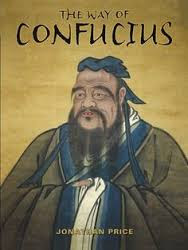
What has Confucius, Hegel and ISIS/ISIS/IS have in common? Yes, they all look into the past and try to live the glory days of the past. Thankfully, the similarities end there. Unlike the former two who try to extract the good things of the glorious past, ISIS seems content to reliving the tainted past complete with barbarism, ignorances, ancient thinking and prejudices.
At the time of Kung Fu Tze (Confucius), Chinese society was in tatters after many internal squabbles involving its many states.Confucius' father was a soldier who married a younger wife after his older wife could not produce him a son to continue his legacy. Confucius was born after a penance at the temples. Unfortunately, his father died when he was three.
Being a good learner, he worked at a grain store when he became an adult. The mundaneness of his job must have turned him to an ethnographer who decided to venture from his home state of Lu westwards to learn other cultures.
He had the good fortune of meeting Tao practitioners and the Tao Master himself, Lao Tze.The Chinese philosophy of life is that life is a constant struggle between the heavenly forces of the dragon and the worldly powers of the phoenix. Our task is to balance the two forces. The Taos believe the concept of 'The Way', the forces of Nature that we, as humans, have to conform to, not the other way around. Modern living is guilty of tilting this balance, hence the calamities.
Confucius suggested that society should able to restore its past glory by learning from our ancestors. Specifically, he mentioned the rule of Emperor Jo, the leader ruled with fairness. Confucius said, education, through academia, the arts and music were the way to prosper. Performing rituals, not for the sake of doing but to appreciate the noble values of our ancestors, helps to maintain hierarchy in the family.
He was hoping that his hierarchal order would help rulers to administer. Many problems in the country are due to the waywardness of the leaders. He should look at his God-given post as an honour from the Gods and should rule with responsibility. When the ruler fails, the people have the right to mutiny.Confucius' teachings gained fame in the Han Dynasty and were the core of Chinese education until the 20th century when it was looked upon as a hindrance to unabated progress. Youngsters with the prodding of Mao and the Red Guards viewed them as if his teachings were pulling them backwards from the stream of development. Kung Fu Tze became the enemy of the state.
Confucius and his teachings were given a short in the arm in the 21st century. People re-embraced his teachings. Rituals humble us. It brings the goodness in everyone. Our world which is at the brink of destruction, filled with irrationality and loss of compassion, could benefit from his wisdom.

http://asok22.wix.com/rifle-range-boy
http://.facebook.com/farouk.gulsara
#3. Confucius

What has Confucius, Hegel and ISIS/ISIS/IS have in common? Yes, they all look into the past and try to live the glory days of the past. Thankfully, the similarities end there. Unlike the former two who try to extract the good things of the glorious past, ISIS seems content to reliving the tainted past complete with barbarism, ignorances, ancient thinking and prejudices.
At the time of Kung Fu Tze (Confucius), Chinese society was in tatters after many internal squabbles involving its many states.Confucius' father was a soldier who married a younger wife after his older wife could not produce him a son to continue his legacy. Confucius was born after a penance at the temples. Unfortunately, his father died when he was three.
Being a good learner, he worked at a grain store when he became an adult. The mundaneness of his job must have turned him to an ethnographer who decided to venture from his home state of Lu westwards to learn other cultures.
He had the good fortune of meeting Tao practitioners and the Tao Master himself, Lao Tze.The Chinese philosophy of life is that life is a constant struggle between the heavenly forces of the dragon and the worldly powers of the phoenix. Our task is to balance the two forces. The Taos believe the concept of 'The Way', the forces of Nature that we, as humans, have to conform to, not the other way around. Modern living is guilty of tilting this balance, hence the calamities.
Confucius suggested that society should able to restore its past glory by learning from our ancestors. Specifically, he mentioned the rule of Emperor Jo, the leader ruled with fairness. Confucius said, education, through academia, the arts and music were the way to prosper. Performing rituals, not for the sake of doing but to appreciate the noble values of our ancestors, helps to maintain hierarchy in the family.
He was hoping that his hierarchal order would help rulers to administer. Many problems in the country are due to the waywardness of the leaders. He should look at his God-given post as an honour from the Gods and should rule with responsibility. When the ruler fails, the people have the right to mutiny.Confucius' teachings gained fame in the Han Dynasty and were the core of Chinese education until the 20th century when it was looked upon as a hindrance to unabated progress. Youngsters with the prodding of Mao and the Red Guards viewed them as if his teachings were pulling them backwards from the stream of development. Kung Fu Tze became the enemy of the state.
Confucius and his teachings were given a short in the arm in the 21st century. People re-embraced his teachings. Rituals humble us. It brings the goodness in everyone. Our world which is at the brink of destruction, filled with irrationality and loss of compassion, could benefit from his wisdom.

http://asok22.wix.com/rifle-range-boy
http://.facebook.com/farouk.gulsara

Published on October 20, 2016 09:30





